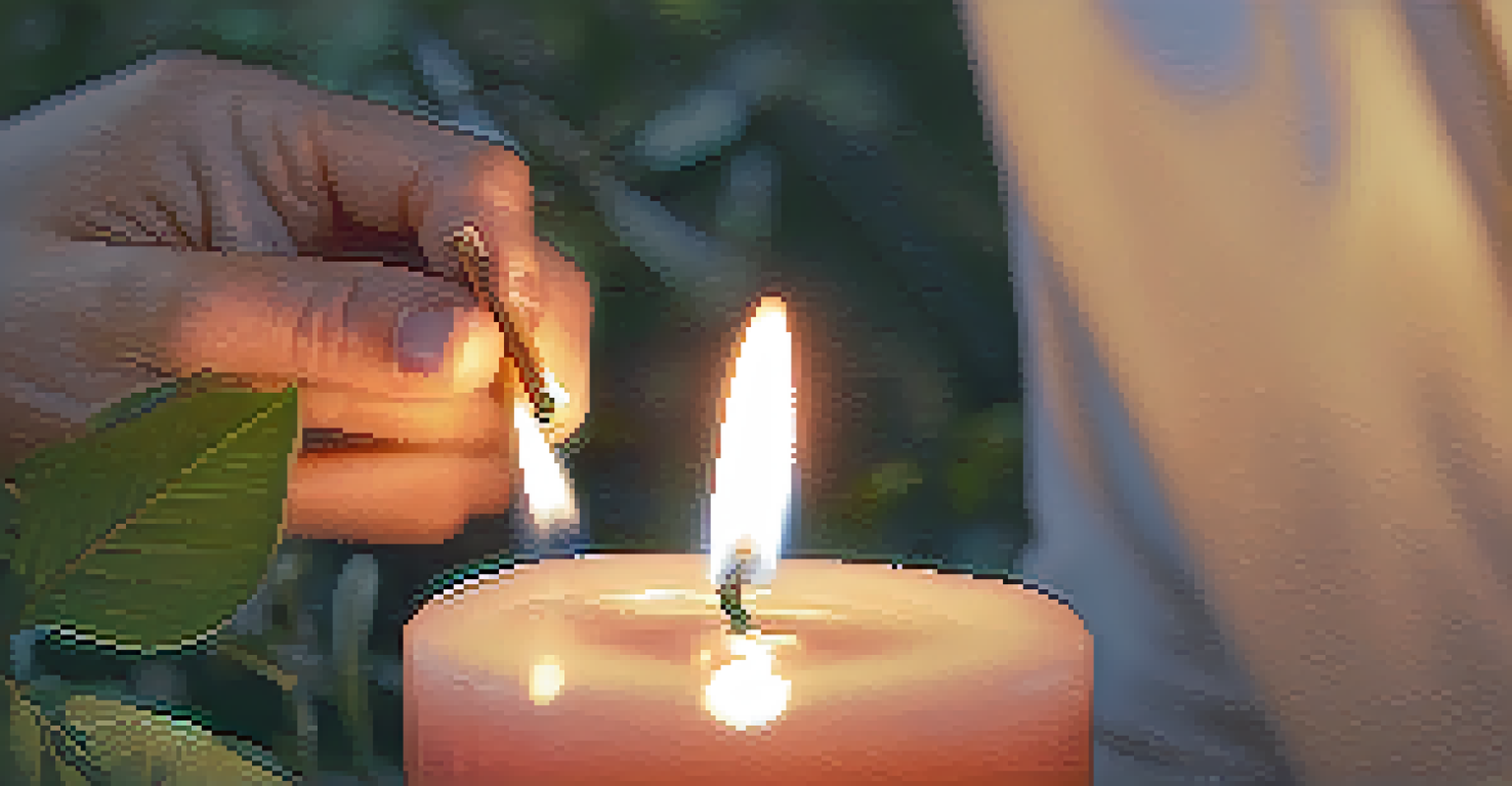The Healing Power of Spirituality in Emotional Recovery Journeys

Understanding Spirituality in Emotional Healing
Spirituality can be seen as a personal journey that may involve connecting with a higher purpose or energy. It’s not strictly tied to religion; rather, it’s about finding meaning and comfort, which can be vital during emotional recovery. Many people turn to spiritual practices as a way to navigate through their feelings, seeking solace and understanding in difficult times.
The wound is the place where the Light enters you.
For some, spirituality offers a framework for addressing life's challenges, allowing individuals to reflect on their experiences and emotions. This process can create a sense of clarity and peace, helping to alleviate the burden of emotional pain. Think of spirituality as a guiding light, illuminating the path through the darkness of emotional struggles.
Moreover, spirituality often encourages practices such as meditation, prayer, or mindfulness, which can significantly reduce stress and anxiety. These practices provide an opportunity to slow down, center oneself, and foster a deeper connection with inner thoughts and feelings. This connection is crucial for anyone on a journey of emotional recovery.
The Role of Community in Spiritual Healing
Community plays a significant role in spiritual healing, as it provides support and understanding from others who may share similar experiences. Engaging with a community can help individuals feel less isolated and more understood, which is essential during emotional recovery. Whether it’s joining a spiritual group or participating in community service, the act of connecting can be incredibly healing.

Sharing stories and experiences within a community can foster a sense of belonging, reminding individuals that they are not alone in their struggles. This shared vulnerability can build strong bonds and create a safe environment for healing. Just think about how comforting it is to share a laugh or a tear with someone who truly understands your journey.
Spirituality Aids Emotional Healing
Engaging with spirituality can provide individuals with comfort and a sense of purpose during their emotional recovery journey.
Additionally, many spiritual communities focus on compassion and empathy, which can provide a nurturing atmosphere that encourages personal growth. These spaces often emphasize forgiveness and acceptance, allowing individuals to let go of past grievances and move forward in their recovery journey. The healing power of togetherness cannot be underestimated.
Mindfulness as a Spiritual Practice
Mindfulness is often regarded as a key component of spiritual practice, allowing individuals to cultivate awareness of the present moment. This practice helps in recognizing thoughts and feelings without judgment, which is crucial for those healing emotionally. By focusing on the here and now, people can gradually release the grip of past traumas and anxieties about the future.
Forgiveness is not an occasional act, it is a constant attitude.
Engaging in mindfulness can be as simple as taking a few deep breaths or observing the natural world around us. This practice encourages individuals to step back from their emotional turmoil and approach it with curiosity rather than fear. Imagine being able to observe your thoughts like clouds drifting by—this perspective can be incredibly liberating.
Furthermore, mindfulness promotes self-compassion, which is essential in the healing process. By treating ourselves with kindness and understanding, we create a supportive inner dialogue that nurtures emotional recovery. This shift can transform how we perceive our struggles, turning them into opportunities for growth and learning.
The Impact of Rituals on Emotional Healing
Rituals, whether they are daily practices or special ceremonies, can have a profound impact on emotional recovery. Engaging in rituals provides a sense of stability and predictability, which can be comforting during tumultuous times. These structured moments can serve as anchors, helping individuals stay grounded amidst emotional upheaval.
Rituals can take many forms, from lighting a candle during meditation to celebrating significant life events with loved ones. Each ritual creates a space for reflection and connection, allowing individuals to honor their feelings and experiences. Think of these moments as checkpoints on the journey of recovery, where one can pause, reflect, and recharge.
Community Enhances Healing Process
Connecting with a supportive community can alleviate feelings of isolation, fostering a nurturing environment for emotional growth.
Additionally, rituals can foster a deeper connection to one's spirituality, reinforcing the belief that there is meaning and purpose in our experiences. They help individuals create a narrative around their healing journey, turning pain into powerful stories of resilience. This process can be incredibly empowering and transformative.
Forgiveness as a Spiritual Practice
Forgiveness is often regarded as one of the most challenging yet liberating aspects of emotional recovery. It is not just about letting go of resentment towards others, but also about forgiving oneself for past mistakes. This spiritual practice can free individuals from the heavy burden of guilt and anger, paving the way for healing.
Embracing forgiveness involves acknowledging pain while choosing to release its hold on our lives. This process can lead to profound emotional healing, allowing individuals to move forward without the weight of past grievances. Picture forgiveness like shedding an old skin; it may be uncomfortable, but ultimately, it leads to renewal and growth.
Moreover, forgiveness is a deeply personal journey that varies for everyone. It’s important to remember that it doesn’t mean condoning harmful behavior; rather, it’s about reclaiming power over one’s emotional well-being. Integrating forgiveness into spiritual practices can create a pathway to inner peace and emotional freedom.
Finding Purpose Through Spirituality
One of the most profound aspects of spirituality in emotional recovery is the search for purpose. Many individuals find that connecting with their spiritual side helps them discover a sense of meaning in their experiences, even the painful ones. This newfound purpose can be incredibly motivating, driving individuals to heal and grow.
When we engage with our spirituality, we often reflect on our values, beliefs, and passions. This process can illuminate what truly matters to us, guiding our actions and decisions as we navigate recovery. Imagine turning your struggles into a compass, pointing you towards a more fulfilling and purposeful life.
Mindfulness and Rituals for Recovery
Practices like mindfulness and rituals help individuals stay grounded, promoting reflection and deeper connections to their healing journey.
Additionally, finding purpose can enhance resilience, as individuals become more equipped to face challenges with a renewed sense of hope. This journey of self-discovery fosters a deeper connection to oneself and the world around us. Spirituality can serve as a powerful catalyst for transformation in the emotional recovery journey.
Embracing the Journey of Emotional Recovery
The journey of emotional recovery is rarely linear; it often involves ups and downs, twists and turns. Embracing this journey means accepting that healing is a process, and spirituality can be a supportive companion along the way. It encourages individuals to remain open to growth and transformation, even in the face of setbacks.
As individuals explore their spirituality, they may find comfort in knowing that they are not alone in their struggles. This connection can foster a sense of belonging and community, which is vital for emotional recovery. Just like a river flows through various landscapes, so too does the path to healing take us through different emotional terrains.

Ultimately, embracing spirituality in the recovery journey can open doors to new perspectives and possibilities. It empowers individuals to reclaim their narratives, transforming pain into strength and resilience. Remember, every step taken on this journey is a step towards a brighter, more fulfilling future.